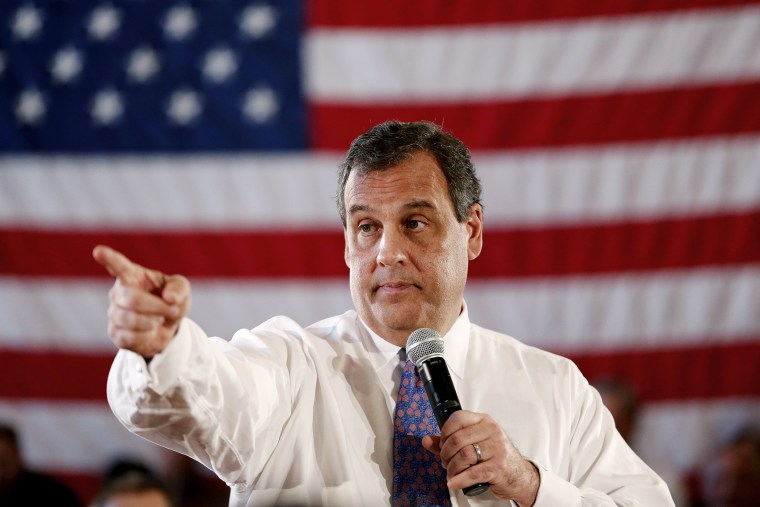About a month ago, New Jersey Gov. Chris Christie (R) started telling party insiders that he's ready to make "
overhauling" Medicare and Social Security the centerpiece of his national campaign.
He apparently wasn't kidding. The scandal-plagued Republican is launching a major swing through New Hampshire this week, announcing
a nine-stop tour in the nation's first primary state, starting today at the New Hampshire Institute of Politics at Saint Anselm College in Manchester. According to the
Wall Street Journal, social-insurance programs are
at the top of the agenda.
Gov. Chris Christie called for reduced Social Security benefits for seniors earning over $80,000 and eliminating the benefit entirely for individuals making $200,000 and up, along with raising the retirement age to 69 from 67. In a speech here Tuesday morning, the potential Republican candidate spoke about the need to overhaul Social Security, Medicaid, Medicare and disability insurance -- perhaps the most significant policy proposal to date in the 2016 race.
Though some of specific details are not yet available, according to a copy of the speech made available to the media, Christie intends to raise the Medicare eligibility age to 67 by 2040, and again to 69 for the following generation.
As for Social Security, the GOP governor and likely presidential candidate envisions benefit cuts for those making more than $80,000 per year, as well as phasing out Social Security payments "entirely for those that have $200,000 a year" of non-Social Security income.
Christie apparently sees this as part of his bold persona, telling his audience today, "Washington is afraid to have an honest conversation about Social Security, Medicare, and Medicaid with the people of our country. I am not."
In the context of the 2016 race, Christie no doubt realizes how challenging it is to cut through and generate interest in his candidacy with so many high-profile rivals already on the campaign trail. The governor has apparently concluded running as the guy who supports Medicare and Social Security cuts is the way to differentiate himself from the pack. I'm skeptical of the gambit -- much of the Republican base tends to be older -- but he's evidently prepared to take the risk.
It also sets the stage for a terrific debate with Democrats, many of whom
are "pushing the party not just to defend benefits but to increase them"
The call for higher benefits is a marked difference from recent years in which the White House and Republicans were negotiating deficit-cutting deals, leaving liberals to argue merely for staving off benefit cutbacks. Separately, many experts in both parties have long argued that extending the solvency of the program would require a combination of benefit cuts and tax increases. The liberals' argument is that Social Security benefits are meager and that people in retirement need more, not less, money. Some also contend that concerns about the program's solvency are exaggerated. And inside the Democratic Party, that argument is gaining traction. Legislation increasing benefits, and boosting payroll taxes to cover the cost, now has 58 co-sponsors in the House.
Congressional Dems have become
increasingly enthusiastic about this approach over the last year or so, and it's safe to say Hillary Clinton will be under pressure from the left to embrace the idea of expanded benefits as part of her 2016 platform.
What's left are some clear dividing lines, with well-defined contingents for voters to choose from: (1) Republicans who want to privatize social-insurance out of existence; (2) Republicans who want to cut benefits; (3) Democrats who want to leave these programs as they are; and (4) and Democrats who want to expand benefits beyond their current levels.
Let the debate begin.
